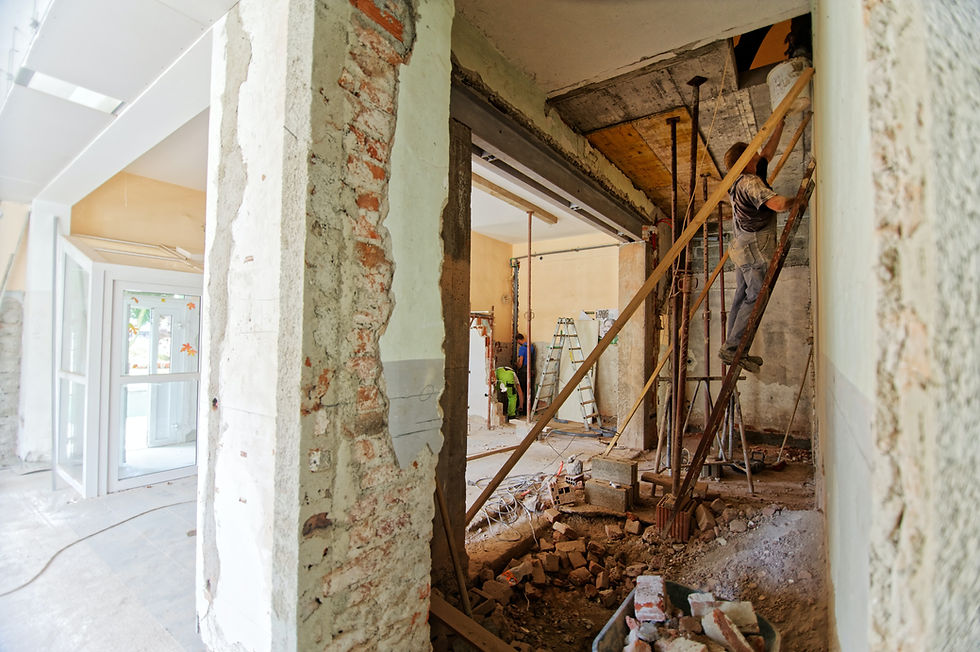Special Inspection 1705.26: Navigating Weekly Tenant Protection Plan Compliance Inspections During NYC Construction
- Built Engineers

- May 21, 2024
- 3 min read
Updated: Sep 11, 2024

When construction, alteration, or partial demolition occurs in occupied multiple dwellings, tenant safety becomes a crucial concern. New York City’s Building Code addresses this through the requirements outlined in Section 1705.26, which mandates that special inspections be conducted to verify compliance with the Tenant Protection Plan (TPP). These inspections ensure that tenants are protected from hazards and disruptions during construction work, as provided for in Chapter 1 of Title 28 of the Administrative Code and Section 3303.10 of the Building Code.
Special Inspections for Tenant Protection Plan Compliance
In any construction or demolition project where a TPP is required, a special inspector must periodically verify compliance. These inspections are vital in ensuring that tenants remain safe and that essential services, such as heat, water, electricity, and access to exits, are not disrupted. Section 1705.26.1 and 1705.26.2 lay out the detailed requirements for these special inspections, specifying the frequency of inspections and the reporting standards to be followed.
Inspection Frequency (Section 1705.26.1)
According to Section 1705.26.1, special inspections must be performed throughout the duration of the tenant protection plan. The goal is to verify that the construction or demolition work is being conducted safely and according to the established protections outlined in the TPP. The code outlines specific intervals for inspections, which must occur at the following times:
Before Work Begins: Inspections are required prior to the start of construction or demolition to document pre-existing conditions.
At the Start of Work: An inspection is required at the beginning of construction or demolition.
Weekly: Inspections must be conducted at least once per week during construction or demolition operations.
Post-Violation: If a violation of the tenant protection plan has been issued, an inspection must be conducted to verify that the violation has been corrected.
When Operations Move: If the construction or demolition work moves to a different part of the building, an inspection must be performed to ensure the new location complies with the TPP.
When Operations Change: If there are changes in construction or demolition methods that require different protective measures, an inspection must be performed to verify compliance with the updated safety requirements.
Reporting Requirements (Section 1705.26.2)
Special inspectors are required to maintain detailed records of all inspections conducted under the TPP. As stated in Section 1705.26.2, these reports must be documented in a log book, which includes an entry for each inspection performed. The log should indicate whether the construction or demolition work is being conducted in accordance with the TPP, and copies of the log must be kept at the job site and at the office of the special inspector.
This log is critical for ensuring transparency and accountability throughout the project. It serves as an official record that the work is proceeding safely and in compliance with the protection plan, and it must be available for review at all reasonable times.
Exceptions to Special Inspections
There are exceptions to the requirement for special inspections under Section 1705.26. These exceptions apply in specific cases where the scope of the work does not significantly impact the building or its tenants. Special inspection for tenant protection plan compliance is not required in the following situations:
Three-Family Homes: Construction work on properties classified as three-family homes does not require a special inspection.
Owner-Occupied Units with No Service Disruption: If the work is limited to the interior of a single dwelling unit in an occupied multiple dwelling and there is no disruption to the essential services of other units, a special inspection is not required. For condominium or cooperative properties, the unit must be occupied by the owner of record.
Small Multiple Dwellings: For multiple dwellings that are three stories or less in height, special inspections are not required when the work is limited to the interior of a single unit.
Why Tenant Protection Plan Compliance is Important
TPP compliance ensures that construction work is performed responsibly and without putting tenants at risk. Failure to comply with TPP requirements can result in delays, violations, and fines, as well as potential legal liabilities. By understanding and adhering to the provisions of Section 1705.26, property owners and contractors can ensure their projects proceed smoothly while keeping tenant welfare a top priority.






Comments